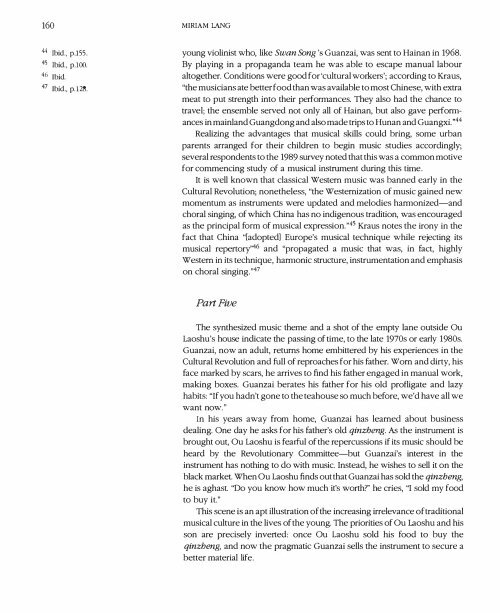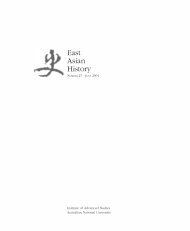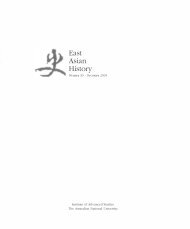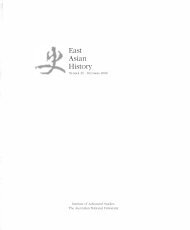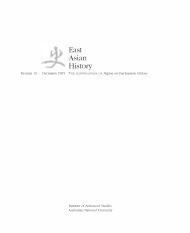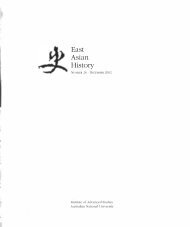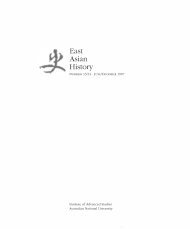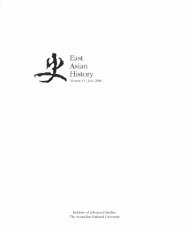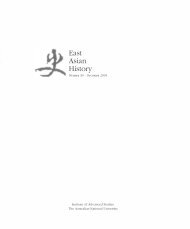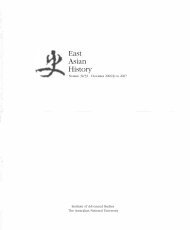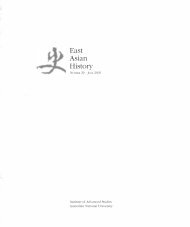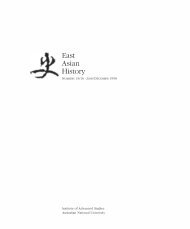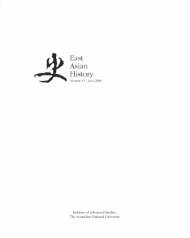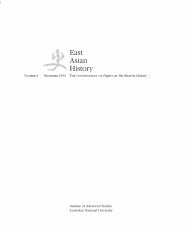Observations from a Film - (Miriam Lang) (PDF ... - East Asian History
Observations from a Film - (Miriam Lang) (PDF ... - East Asian History
Observations from a Film - (Miriam Lang) (PDF ... - East Asian History
- No tags were found...
You also want an ePaper? Increase the reach of your titles
YUMPU automatically turns print PDFs into web optimized ePapers that Google loves.
160MIRIAM LANG44 Ibid., p.155.young violinist who, like Swan Song 's Guanzai, was sent to Hainan in 1968.4 5 Ibid., p.lOO.By playing in a propaganda team he was able to escape manual labour46 Ibid.altogether. Conditions were good for 'cultural workers'; according to Kraus,4 7 Ibid., p.128. "the musicians ate better food than was available to most Chinese, with extrameat to put strength into their performances. They also had the chance totravel; the ensemble served not only all of Hainan, but also gave performancesin mainland Guangdong and also made trips to Hunan and Guangxi. ,, 44Realizing the advantages that musical skills could bring, some urbanparents arranged for their children to begin music studies accordingly;several respondents to the 1989 survey noted that this was a common motivefor commencing study of a musical instrument during this time.It is well known that classical Western music was banned early in theCultural Revolution; nonetheless, "the Westernization of music gained newmomentum as instruments were updated and melodies harmonized-andchoral singing, of which China has no indigenous tradition, was encouragedas the principal form of musical expression.,,45 Kraus notes the irony in thefact that China "[adopted] Europe's musical technique while rejecting itsmusical repertory,, 46 and "propagated a music that was, in fact, highlyWestern in its technique, harmonic structure, instrumentation and emphasison choral singing." 4 7Pa rt FiveThe synthesized music theme and a shot of the empty lane outside OuLaoshu's house indicate the passing of time, to the late 1970s or early 1980s.Guanzai, now an adult, returns home embittered by his experiences in theCultural Revolution and full of reproaches for his father. Worn and dirty, hisface marked by scars, he arrives to find his father engaged in manual work,making boxes. Guanzai berates his father for his old profligate and lazyhabits: "If you hadn't gone to the teahouse so much before, we'd have all wewant now."In his years away <strong>from</strong> home, Guanzai has learned about businessdealing. One day he asks for his father's old qinzbeng. As the instrument isbrought out, Ou Laoshu is fearful of the repercussions if its music should beheard by the Revolutionary Committee-but Guanzai's interest in theinstrument has nothing to do with music. Instead, he wishes to sell it on theblack market. When Ou Laoshu finds out that Guanzai has sold the qinzbeng,he is aghast. "Do you know how much it's worth?" he cries, "I sold my foodto buy it."This scene is an apt illustration of the increasing irrelevance of traditionalmusical culture in the lives of the young. The priorities of Ou Laoshu and hisson are preCisely inverted: once Ou Laoshu sold his food to buy theqinzbeng, and now the pragmatic Guanzai sells the instrument to secure abetter material life.


